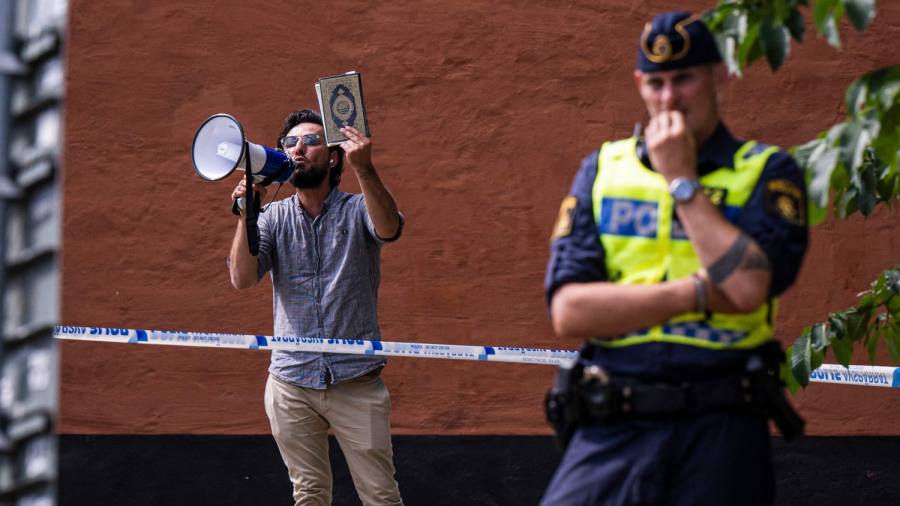
Receive free Denmark updates
We’ll send you a myFT Daily Digest email rounding up the latest Denmark news every morning.
A necessary measure to protect national security or simply caving into pressure from Muslim countries?
Denmark’s and Sweden’s attempts to find a legal way to ban some burnings of holy books such as the Koran have unleashed a fierce debate on potential limits to freedom of speech both domestically and abroad amid a brewing diplomatic crisis.
“The Danish government is on a knife edge between our staunch support for freedom of speech and the necessity to protect Denmark’s security,” said Lykke Friis, a former centre-right minister in Copenhagen who now heads the think-tank Europa.
Jacob Mchangama, a Danish lawyer who is executive director of the Future of Free Speech project, was blunter. “This is a watershed moment. The Danish government has failed miserably,” he said.
Several more Korans have been burnt in the past two days in Copenhagen and Stockholm, leading to the foreign ministers of 57 Muslim countries meeting online to urge the Scandinavian countries to take tough action.
The Organisation of Islamic Cooperation, an intergovernmental body, said late on Monday that it “deplored the recurrence of acts of desecration [of the Koran] and deeply regrets . . . failure to take the necessary measures to prevent such acts in Sweden and Denmark.” It called on its members to take “the necessary measures they deem appropriate”, including recalling their ambassadors for consultation.
But both countries have some of the oldest and strongest legal protections of free speech in the world.
Swedish courts have several times struck down attempts by local police to ban the burnings of the Koran. Many politicians in both countries have urged the Danish and Swedish governments not to bow to pressure from the Islamic world and to keep on defending free speech.
Morten Messerschmidt, leader of the nationalist Danish People’s party, called the proposal from the Danish government to consider a ban on burning holy books in front of foreign embassies “shocking”.
He added: “In Denmark, it’s not the Koran or Muslim rules that apply. They may apply in the Muslim world but here we have freedom of speech — and that also applies to things we don’t like.”
Peter Hummelgaard, Denmark’s justice minister, conceded that the government faced “a lot of political and legal dilemmas”. Authorities in Copenhagen and Stockholm have been spooked by the fierce reaction in Muslim countries to the burnings — including the storming of Sweden’s embassy in Iraq. Swedish and Danish intelligence officials have said the threat to Swedish interests at home and abroad has increased because of the burnings.
“It is a question of whether we, as a collective, should continue to accept that a few individuals choose a way to express themselves that repeatedly insults foreign countries, which means that we risk creating very big problems for ourselves,” added Hummelgaard.
Legal experts are divided over whether and how the two countries could seek to limit the scope to burn holy books. Danish ministers are adamant that a little-used blasphemy law that was repealed in 2017 will not be resurrected but have given little concrete detail other than it is being worked on urgently — a similar message to that given in Stockholm.
Politically, however, it is a tricky message for both governments to get over as much of the debate in Denmark and Sweden in the past decade has been about limiting immigration, with a focus particularly on Muslims. “Basically, domestically all parties reject the proposal,” said Friis.
Mchangama said any partial ban could embolden far-right activists such as Rasmus Paludan, a Dane who has burnt the Koran in both Sweden and Denmark recently.
“There will be much more of a backlash against Islam. There will be more attempts to provoke these countries. The Muslim countries will come back and say you promised us you would stop this kind of activities. Do we keep making the list of prohibitions longer?” he asked.
Paludan himself said he was already looking at possible ways around a possible ban, noting that the government has talked only of halting it outside embassies and that there were other ways of criticising the Koran. The two immigrants from Iraq behind the recent burnings of the Koran in Stockholm said they would carry on until “this book is banned”.
The predicament facing Denmark and Sweden has reminded many of the controversy surrounding the publication of a dozen cartoons of the Prophet Mohammed in a Danish newspaper in 2005.
Back then, Denmark stood strong against severe pressure from Muslim countries, maintaining that free speech and satire were important principles. The government today claims the current situation is different as a few far-right and anti-Islam activists threaten national security.
Mchangama responded that it was fine for the Danish and Swedish governments to say that they disagree with the burnings of the Koran — as they have done — but that if they give into Muslim demands on this issue they will face future pressure to curb free speech in other ways.
He pointed to a different recent burning in Copenhagen when an Iranian Muslim set fire to a Bible, Torah, and the Danish and Swedish flags — and said “nobody batted an eyelid” in Denmark.
He argued that Muslims in Denmark enjoyed far more freedom of religion than in most Muslim countries but that the flipside was that their “most sacred and dear ideas” could be attacked.
If the two Scandinavian countries compromise on that in some form, it would be a “really dramatic shift — what is most astounding is that Denmark and Sweden are two of the most secular, progressive countries in the world, and there is a deep tradition here for mocking religion and political authorities”, Mchangama added.
Additional reporting by Samer Al-Atrush in Dubai